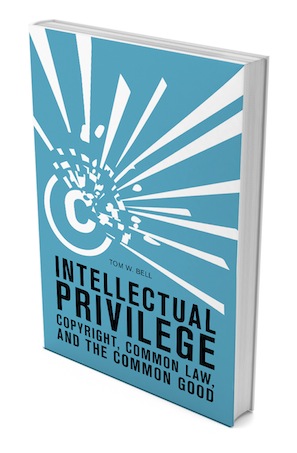 Last week, the Mercatus Center at George Mason University published the new book by Tom W. Bell, Intellectual Privilege: Copyright, Common Law, and the Common Good, which Eugene Volokh calls “A fascinating, highly readable, and original look at copyright[.]” Richard Epstein says that Bell’s book “makes a distinctive contribution to a field in which fundamental political theory too often takes a back seat to more overt utilitarian calculations.” Some key takeaways from the book:
Last week, the Mercatus Center at George Mason University published the new book by Tom W. Bell, Intellectual Privilege: Copyright, Common Law, and the Common Good, which Eugene Volokh calls “A fascinating, highly readable, and original look at copyright[.]” Richard Epstein says that Bell’s book “makes a distinctive contribution to a field in which fundamental political theory too often takes a back seat to more overt utilitarian calculations.” Some key takeaways from the book:
- If copyright were really property, like a house or cell phone, most Americans would belong in jail. That nobody seriously thinks infringement should be fully enforced demonstrates that copyright is not property and that copyright policy is broken.
- Under the Founders’ Copyright, as set forth in the 1790 Copyright Act, works could be protected for a maximum of 28 years. Under present law, they can be extended to 120 years. The massive growth of intellectual privilege serves big corporate publishers to the detriment of individual authors and artist.
- By discriminating against unoriginal speech, copyright sharply limits our freedoms of expression.
We should return to the wisdom of the Founders and regard copyrights as special privileges narrowly crafted to serve the common good.
This week, on Wednesday, May 7, at noon, the Cato Institute will hold a book forum featuring Bell, and comments by Christopher Newman, Assistant Professor, George Mason University School of Law. It’s going to be a terrific event and you should come. Please make sure to RSVP.

 The Technology Liberation Front is the tech policy blog dedicated to keeping politicians' hands off the 'net and everything else related to technology.
The Technology Liberation Front is the tech policy blog dedicated to keeping politicians' hands off the 'net and everything else related to technology.